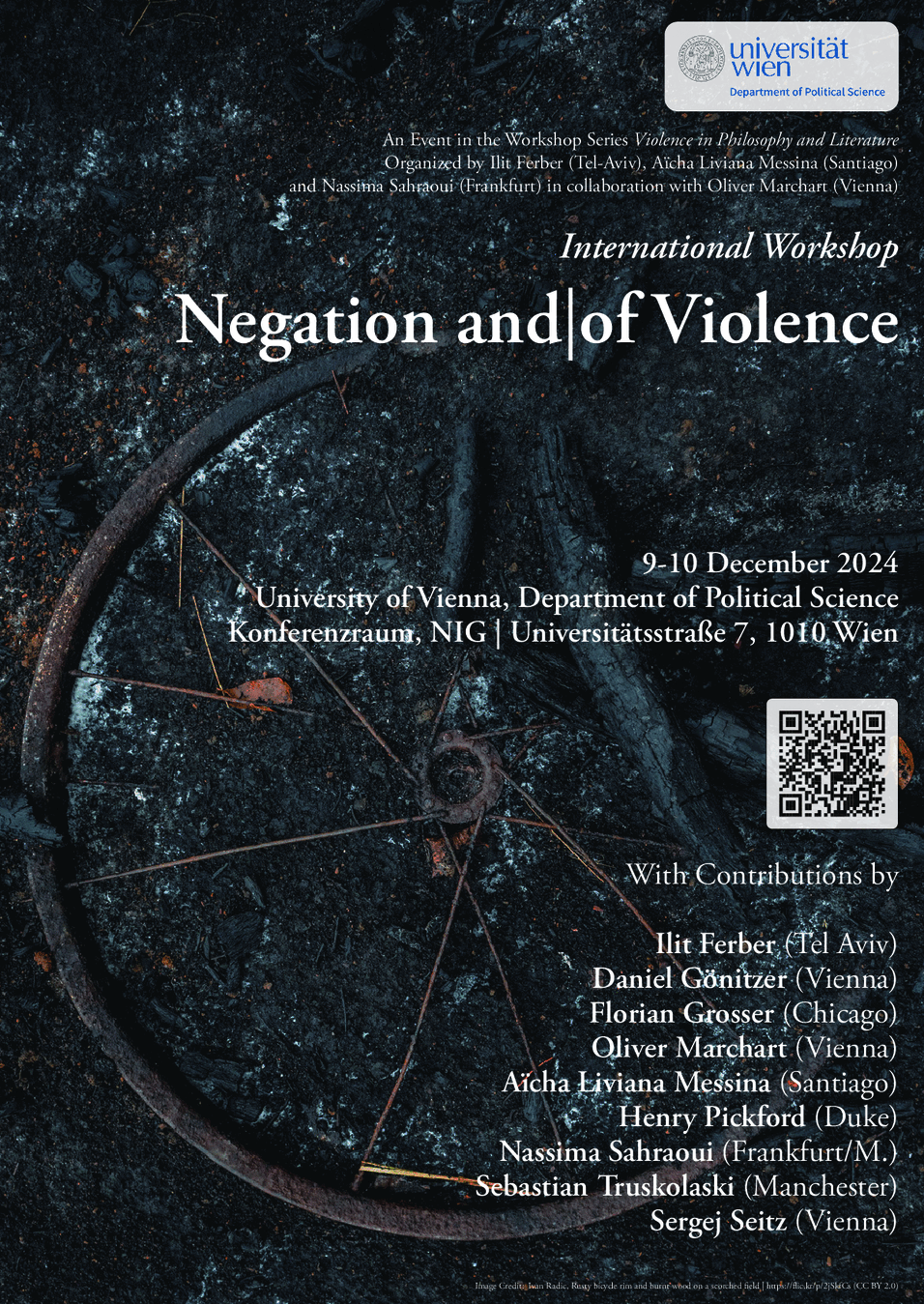VIOLENCE IN PHILOSOPHY AND LITERATURE VIII
9-10 DECEMBER 2024
Konferenzraum, 2. Stock, NIG
Organizers: Ilit Ferber (Tel-Aviv), Adam Lipszyc (Warsaw), Aïcha Liviana Messina (Santiago), Nassima Sahraoui (Frankfurt); in collaboration with Oliver Marchart (Vienna)
Description
Negation is one of the oldest operations in philosophy. Trough negation, certain assertions, concepts, situations, or even truths are reversed, turning into their denial or sometimes into mere nothingness. This movement of thought famously culminates in Hegel’s concept of sublation, where negation serves as a dialectical driving force towards development that generates a surplus of determinatedness. But what happens when we think about negation outside of the Hegelian conceptualization? When we consider it not as a mere philosophical exercise, it inherently involves an act of violence that extends beyond the realm of philosophy and is now operative within thought itself. This violence is embedded in various cultural codes and rituals, in the intersubjective network forming our histories, in the narratives and traumas of our lives and of literature, in socio-economic processes of exclusion, and, importantly, it functions as a tool in political power struggles.
Yet violence is not only one of the ways negation appears in our world, but is also deeply rooted in our cultural heritage and values where it is often perceived as a legitimate tool for the maintenance of the social order. Considering negation and violence together, the negation of violence does not equate to denial but rather to an impossibility and inability to recognize violence as such. It is an invisible or silent phenomenon, one that resists objectification. Violence can thus be produced and reproduced in such a way that it appears to have never happened. This concealment is itself a form a violence that faciliates further acts of of violence. But when violence cannot be perceived, it cannot be named, and hence it cannot be denounced either. The negation of violence precludes victims from being recognized as victims, trapping them – and sometimes entire communities – within a cycle of silence and erasure. Particularly literary history offers many narratives where the negation of violence is captured and borne witness to.
If negation constitutively shapes our reality – and hence our perception, thinking, and experience – then the violence inherent in negation is also a integral part of both ourselves and the world. How, then, can we recognize and critically engage with negation and its inherent violence?
Throughout the workshop we will think, rethink, and deconstruct the relation between violence and
negation from both philosophical and literary perspectives. We will pay particular attention to the fact that negation is not merely an object of thought, as it is fundamental to any process of thinking. In challenging the limits of individual disciplines, we will: i) examine various philosophical, social, political, medial, literary, and individual strategies that contribute to the negation of violence; ii) explore different definitions of violence and question the normative framework that influence its understanding and perception; iii) analyze how language, terminologies, and narratives either erase or expose acts of violence.
Following the tradition of this workshop series, we will have one long session devoted to a close-reading of a literary text engaging with negation and violence, and allocate ample time for discussion after each talk. Confirmed speakers: Ilit Ferber (Tel Aviv), Florian Grosser (Chicago), Adam Lipszyc (Warsaw), Oliver Marchart (Vienna), Aïcha Messina (Santiago), Nassima Sahraoui (Frankfurt), Sebastian Truskolaski (Manchester)
Please let us know if you wish to attend by sending an email including a brief biographical note by November 15, 2024.
This workshop is the eights event in a series of gatherings that fall under the epigraph of “Violence in Philosophy and Literature”. It has taken place previously on “Language and Violence” (Tel Aviv University), “Space and Violence” (Polish Academy of Sciences, Warsaw), “Thinking and Writing – Disruption” (ZfL Berlin), “Violence Incorporated” (University of Chicago), “Sound and Violence” (Collège international de philosophie, Paris), “Time and Violence” (Goethe University, Frankfurt), and “Isolation” (Tel Aviv University Online).
Programme
Monday 9 December 2024
10:00-10:30 Welcome and Introduction
I. Violence and Violation in Kafka’s Writings
10:30-12:00 READING SESSION
Franz Kafka: In der Strafkolonie (In the Penal Colony)
Chair: Sergej Seitz
II. Kafkaesque Negations
13:00-14:00 AÏCHA LIVIANA MESSINA (Santiago)
The Cry of Language
14:15-15:15 DANIEL GÖNITZER (Vienna)
“Give It Up!” – Franz Kafka and the Negation of Man”
Chair: Ilit Ferber
III. Affirming Antagonisms? Towards a New Community to Come
16:00-17:00 OLIVER MARCHART (Vienna)
Always Ontologize! Antagonism and Radical Negativity
17:15-18:15 SEBASTIAN TRUSKOLASKI (Manchester/Berlin)
“The Country Whose Seers Proclaim Their Visions Over Corpses”: Hölderlin, Benjamin, Community
Chair: Nassima Sahraoui
Tuesday 10 December 2024
9:30-10:00 Get-Together
IV. (Idiosyncratic) Marxism
10:00-11:00 HENRY PICKFORD (Duke)
Thinking about Violence in Early Marx
11:15-12:15 NASSIMA SAHRAOUI (Frankfurt/Tübingen)
The Tasteless Seeds of History. Thinking in Constellations with Walter Benjamin
Chair: Aïcha Liviana Messina
V. Failures of Identity: Displacement of the Mind
14:00-15:00 FLORIAN GROSSER (Chicago)
Existential Negation: Günther Anders’s Literary and Philosophical Writings on the Forced Migrant Experience
15:15-16:15 ILIT FERBER (Tel Aviv)
The Mind, Failing: Negativity Without Dialectics in Jean Améry
Chair: Oliver Marchart
VI. The Negation of Negation
16:30-17:30 Closing Discussion

